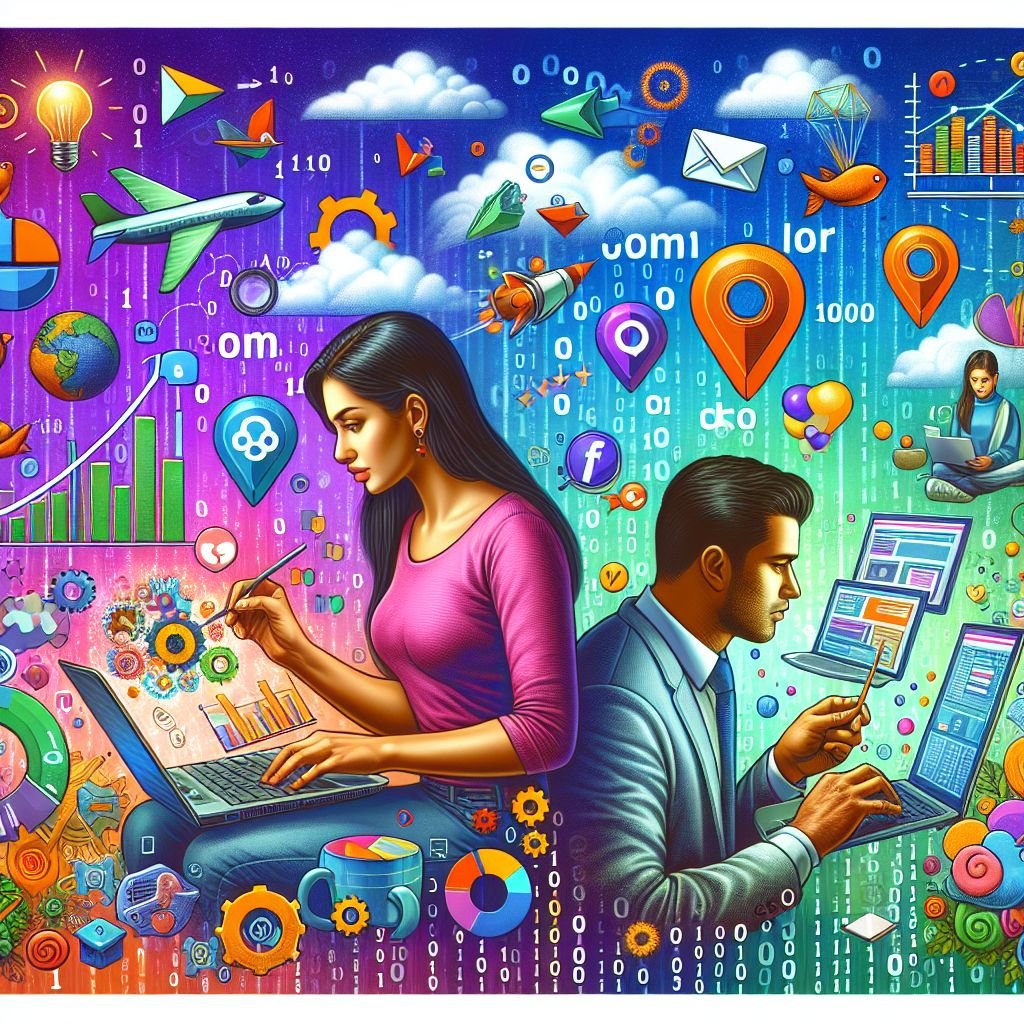Key Takeaways:
- AI-driven automation is revolutionizing digital marketing by personalizing content and optimizing campaigns.
- Marketers can use AI to better understand and segment their audience, leading to more effective targeting.
- Tools like chatbots, programmatic advertising platforms, and SEO optimizers can significantly boost marketing efficiency.
- By integrating AI, businesses can measure campaign success more accurately and make data-driven decisions.
- Getting started with AI in marketing involves identifying automation opportunities and creating a detailed implementation plan.
Unlocking the Power of AI Automation for Your Business
Imagine you’re planning a party. You want to send out invitations, prepare the right amount of food, and create the perfect playlist. Now, what if you could know exactly who will come, what food they’d like, and their favorite songs? That’s the kind of insight and efficiency AI-driven automation brings to digital marketing.
What is AI-Driven Automation?
At its core, AI-driven automation is about machines doing the heavy lifting—processing data, making decisions, and executing tasks—so that humans don’t have to. It’s like having a super-smart assistant who knows your customers better than they know themselves.
Why Digital Marketing Strategies Need AI
Why do we need AI in digital marketing? Because the digital world is a vast ocean of data that’s impossible to navigate alone. AI helps us make sense of this data, understand patterns, and predict what customers will want next. It’s not just about working harder; it’s about working smarter.
Transforming Marketing with Artificial Intelligence
Now, let’s dive into how AI is changing the game for marketers everywhere.
The Rise of Personalized Content
Personalized content is no longer just a ‘nice-to-have’; it’s what customers expect. But how do you create content that speaks to each individual? AI tools analyze data like browsing history and purchase behavior to tailor messages that resonate with each customer. It’s like having a conversation where you’re genuinely understood.
Streamlining Campaigns with Predictive Analytics
Then there’s predictive analytics. This is where AI looks at patterns in data to predict future behavior. It’s like a weather forecast for your marketing campaigns, helping you prepare for what’s coming rather than just reacting to what’s happened.
- Identify which customers are most likely to make a purchase.
- Figure out the best time to send out marketing emails.
- Understand which products to recommend to customers next.
With AI, you’re not just casting a wide net and hoping for the best. You’re fishing with precision, targeting exactly who is ready to bite. Discover more on small business internet marketing strategies to enhance your targeting approach.
Programmatic Advertising Platforms
Let’s talk about programmatic advertising platforms. These platforms use AI to buy and place ads in real-time. They analyze user behavior to show ads to the right person, at the right time, on the right platform. It’s like having a billboard that changes based on who’s looking at it.
For instance, if you’re selling sports equipment, your ads will automatically show up on websites that your target audience visits, during the times they’re most likely to be online. This level of targeting was unheard of in the past, but with AI, it’s becoming the norm.
SEO Optimizers and Content Creators
Next up, SEO optimizers and content creators. AI tools here help ensure that the content you create is not only relevant and engaging but also ranks well on search engines. They can suggest keywords, predict trending topics, and even generate content outlines.
For example, if you’re writing an article about healthy eating, an AI tool can suggest you include terms like ‘plant-based diets’ or ‘superfoods’, which are trending and have high search volumes. This ensures your content stays relevant and visible.
Efficiency and Revenue: The AI Marketing Duo
Efficiency and revenue go hand in hand when AI is in the mix. By automating routine tasks and making smarter decisions, marketers can save time and money while driving better results. It’s a win-win scenario where marketers can focus on strategy and creativity, leaving the data crunching to AI.
Accelerating Growth with AI Targeting and Segmentation
AI targeting and segmentation are all about getting to know your audience on a deeper level. By analyzing data, AI can create detailed customer profiles, which can be used to tailor marketing efforts. This means messages that hit home and campaigns that resonate, leading to accelerated growth.
Imagine being able to segment your audience not just by demographics but by behavior, interests, and even predicted future actions. That’s the kind of targeting AI brings to the table.
Measuring Success with AI-Enhanced Analytics
How do you know if your marketing is working? AI-enhanced analytics can tell you. These tools track performance across channels, giving you a clear picture of what’s working and what’s not. They can even forecast future performance based on historical data.
For example, if your email open rates are declining, AI can help pinpoint whether it’s an issue with your subject lines, send times, or something else entirely. Armed with this knowledge, you can make adjustments to improve your results.
“AI doesn’t just provide insights; it provides actionable insights that you can use to refine your marketing strategy in real-time.”
Integrating AI Automation in Your Marketing Strategy
Ready to jump into AI-driven marketing? Great! The first step is identifying where AI can make the biggest impact in your current strategy. Look for tasks that are repetitive, time-consuming, and data-intensive—these are ripe for automation.
Identifying Automation Opportunities
Start by mapping out your marketing processes. Look for areas where you’re spending a lot of time on manual tasks, like data entry, report generation, or campaign management. These are areas where AI can save you hours every week.
Developing an AI Implementation Plan
Once you’ve identified opportunities for automation, it’s time to develop a plan. This should include what tools you’ll need, how they’ll integrate with your current systems, and who on your team will manage the transition. Remember, the goal is to make your marketing more efficient and effective, not to add complexity.
Developing a solid AI implementation plan is crucial. This plan serves as your roadmap, guiding you through the complexities of integrating AI into your existing marketing efforts. Think of it as a recipe for success, ensuring that each ingredient—your AI tools and strategies—blends seamlessly to create a powerful marketing mix.
Developing an AI Implementation Plan
When creating your AI implementation plan, consider the following steps:
- Assess your current marketing activities and pinpoint areas where AI can have the most significant impact.
- Research and select the AI tools that best suit your business needs and marketing goals.
- Train your team on these new tools, ensuring they understand how to use them effectively.
- Set clear objectives and key performance indicators (KPIs) to measure the success of your AI integration.
- Regularly review and adjust your strategy based on the insights and data provided by your AI tools.
By methodically working through these steps, you’ll be setting yourself up for a smooth transition to a more automated, intelligent marketing approach.
Staying Ahead: The Future of AI in Marketing
The future of AI in marketing is not just about keeping pace with technology—it’s about setting the pace. It’s about anticipating changes and being ready to adapt at a moment’s notice. With AI, you’re not just following trends; you’re on the cutting edge, shaping the future of how marketing is done.
Emerging AI Technologies to Watch
As you look to the horizon, keep an eye on emerging AI technologies that can further transform your marketing. From advanced natural language processing (NLP) that can interpret and respond to human emotions, to AI systems that can create entirely new product designs based on consumer feedback, the possibilities are expanding every day.
Adapting to Evolving Consumer Behaviors with AI
Consumer behaviors are always changing, and AI is the perfect tool to help you stay in step. With its ability to analyze data in real-time, AI helps you understand and adapt to these changes as they happen. Whether it’s a sudden shift in buying patterns or a new trend taking off on social media, AI gives you the agility to respond quickly and effectively.
The Path to Digital Dominance with AI Automation
The path to digital dominance with AI automation is clear. It’s a journey of transformation, innovation, and growth. By embracing AI, you’re not just improving your marketing; you’re reinventing it. You’re delivering experiences that are more personalized, more engaging, and more memorable than ever before.
Next Steps: From Strategy to Action
Now that you understand the power of AI-driven automation, it’s time to take action. Start small if you need to, but start. Experiment with AI tools, measure the results, and scale your successes. Remember, the journey of a thousand miles begins with a single step—and the journey to AI mastery is no different.
- Review your marketing strategy and identify areas where AI can make an immediate impact.
- Begin integrating AI tools into your workflow, starting with those that address your most pressing challenges.
- Monitor the results closely, and be prepared to iterate and adapt as you learn what works best for your business.
By taking these steps, you’re not just future-proofing your marketing; you’re future-proofing your entire business.
Partnering with AI Experts for Optimal Results
As you embark on your AI journey, consider partnering with experts who can help you navigate the complexities of this new landscape. These partnerships can provide valuable insights, support, and guidance, ensuring that you get the most out of your AI investments.
Remember, the goal is not to replace your marketing team with robots but to empower them with tools that amplify their strengths and complement their skills. With the right partnership, AI becomes an extension of your team’s creativity and intelligence—not a replacement for it.
In conclusion, AI-driven automation is not just the future of digital marketing—it’s the present. It’s here, it’s now, and it’s ready to help you take your marketing to new heights. So, embrace AI, harness its power, and watch as your business reaches levels of efficiency and engagement you once thought impossible. The future is bright, and with AI in your toolkit, it’s within your grasp.
As the digital landscape evolves, the role of AI-driven marketing automation in revolutionizing customer engagement and streamlining strategic initiatives is becoming more apparent. Companies leveraging AI technologies are gaining significant advantages by personalizing customer interactions and optimizing marketing efforts with unprecedented precision.


Your point of view caught my eye and was very interesting. Thanks. I have a question for you.
Your point of view caught my eye and was very interesting. Thanks. I have a question for you.
Your point of view caught my eye and was very interesting. Thanks. I have a question for you.
I don’t think the title of your article matches the content lol. Just kidding, mainly because I had some doubts after reading the article.
https://t.me/Top_BestCasino/127
Your article helped me a lot, is there any more related content? Thanks! https://www.binance.info/id/register?ref=UM6SMJM3
Can you be more specific about the content of your article? After reading it, I still have some doubts. Hope you can help me. https://www.binance.com/sl/register?ref=GQ1JXNRE
WinWinCasino777, eh? Sounds promising! Always looking for a new place to test my skills. Hope they’ve got some good slots. I found it nice! Give it a try here: winwincasino777
Looking for a clean vbetlogo design. Found a few, but not quite what I’m after. Anyone have good resources or designers to recommend? A good logo is key, ya know! See some examples at vbetlogo
Your point of view caught my eye and was very interesting. Thanks. I have a question for you.
Vermelho555jogo…it’s got a ring to it! Not a bad place to spend some time. Easy to get started, and a few different games to keep you entertained. Check it out: vermelho555jogo!
Alright, 188betlinkvao looks like a decent place, easy to navigate. See for yourself at 188betlinkvao
Your article helped me a lot, is there any more related content? Thanks! https://www.binance.info/zh-CN/register?ref=WFZUU6SI
mwcbet https://www.mwcbeth.com